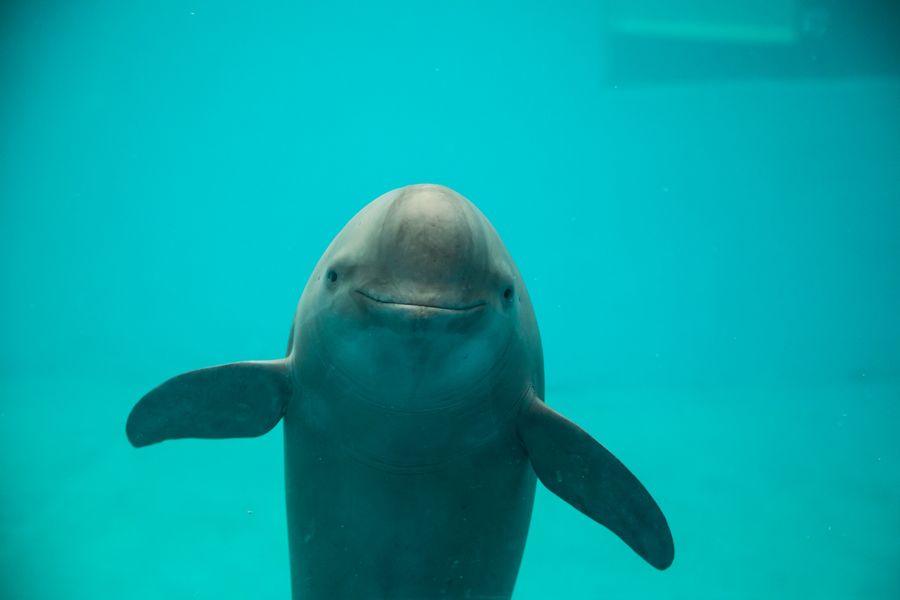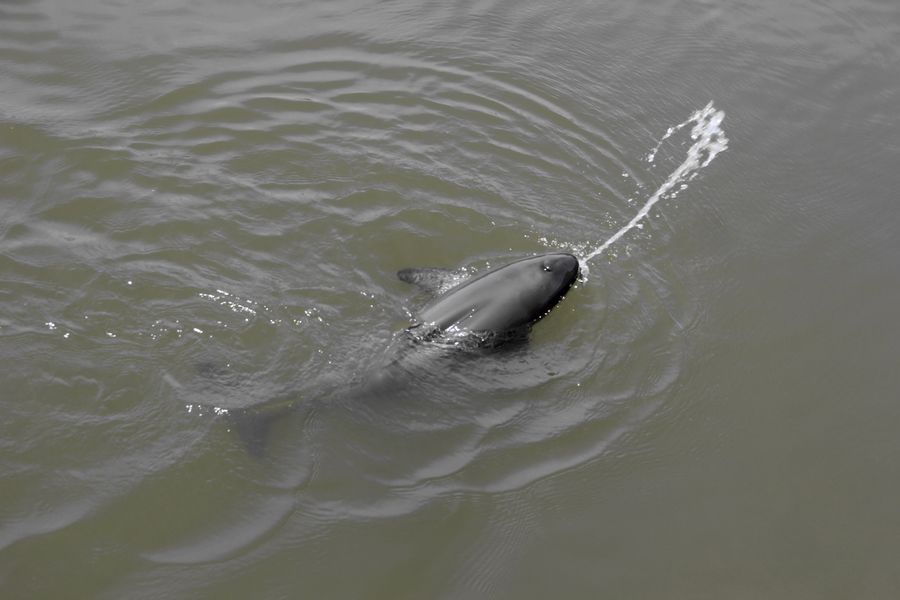
From the People's Daily App.
This is Story in the Story.
Somewhere along the lower reaches of China's Yangtze River, a slick black back briefly arches above the silvery surface as one of the world's most endangered animals emerges, gulping for some air.
Such a glimpse of the Yangtze finless porpoise is taken by many Chinese as a good omen since the fleshy aquatic animal is critically endangered, rarer even than the country's poster child for species conservation, the giant panda.
The freshwater porpoise with no dorsal fin is native to China. They only pulse through the waters in the central and eastern parts of the Yangtze including two lakes naturally connected to the 6,300-km river, Dongting and Poyang, according to conservationists.
The latest research on the species released by the Ministry of Agricultural and Rural Affairs in 2018 showed that there was a wild population of just 1,012 still navigating the twists and turns of the longest river in Asia.
Today’s Story in the Story looks at the efforts being made along the Yangtze to help the finless porpoise thrive.

Undated file photo provided by the Nanjing Yangtze Finless Porpoise Conservation Association shows a Yangtze finless porpoise in the water. (Photo: Xinhua)
After its more-storied cousin, the Baiji dolphin, was declared "functionally extinct" in 2007 in the same waters, the finless porpoise is thus believed to be the Yangtze's last surviving mammal, said Jiang Meng, secretary-general of the Nanjing Yangtze Finless Porpoise Conservation Association.
With its mouth fixed in a permanent grin, the rotund finless porpoise is adored in China as a "smiling angel." But this "angel" that has lived in the waters for some 25 million years is fighting for its very survival.
The riverbank of the Yangtze used to be studded with steel mills and petrochemical companies that took advantage of cheap water transport, causing water quality to deteriorate.
"Unsustainable fishing which reduced its natural prey, collisions with shipping traffic and water pollution have all impacted the porpoise's health and rendered it to be critically endangered," Jiang said.
The extinction of the Baiji stung the collective conscience of the Chinese people. "We cannot afford to let the 'smiling angel' go extinct," he added. "Its fate foreshadows the health of the whole river ecosystem. So, the crisis is also our own."
The finless porpoise requires healthy river ecosystems, and so do the millions of people who live in the Yangtze River basin. Protecting the creature will also help alleviate China's food and water security issues, said Karin Krchnak, director of the World Wildlife Fund's freshwater program.
The quality of the porpoise's habitat is a benchmark for its protection, said Sun Lifeng, an official with the Nanjing Dolphin Nature Reserve. "We have been devoted to the afforestation of the Yangtze River shoreline as wetlands are critical for the entire ecological environment."

File photo taken on Sept. 2, 2019 shows a Yangtze finless porpoise in the Yangtze River in Nanjing, capital of east China's Jiangsu Province. (Photo: Xinhua)
Since 2016, the environmental protection of the Yangtze, rather than large-scale development, has become the dominant focus of the country's river development plans.
Jiangsu Province, in the lower reaches of the Yangtze, closed more than 6,000 chemical firms near the river in the last three years. And Chongqing, lying upstream, aims to remove all companies which have dilapidated equipment from the river this year.
"Official clampdowns on overfishing and polluting activities have gradually restored the water quality of the Yangtze," Jiang said.
Yang Jinlong was once a fisherman in Nanjing. The 45-year-old chose to be a patrolman in an all-volunteer monitoring team consisting of dozens of fish farmers in 2016, when the city closed a large number of fishing-related enterprises along the Yangtze.
Yang gradually came to understand the finless porpoises after years of hard work recording their tracks at the monitoring sites in the protection zone.
"I grew up near the Yangtze and it brings me peace of mind," Yang said. "It doesn't matter that we can't fish, but it matters that the 'smiling angel' keeps smiling."
With increasing environmental awareness, more Chinese people are willing to volunteer to protect the porpoise, Yang said. "When I see the animal jumping out of the water, I feel fulfilled. It's like everything we've done is worth it.
"And we see changes," he added. "Little young finless porpoises can often be spotted now, which indicates the endangered mammal is thriving."
(Produced by Nancy Yan Xu, Brian Lowe, Lance Crayon and Paris Yelu Xu. Music by: bensound.com. Text from Xinhua.)


